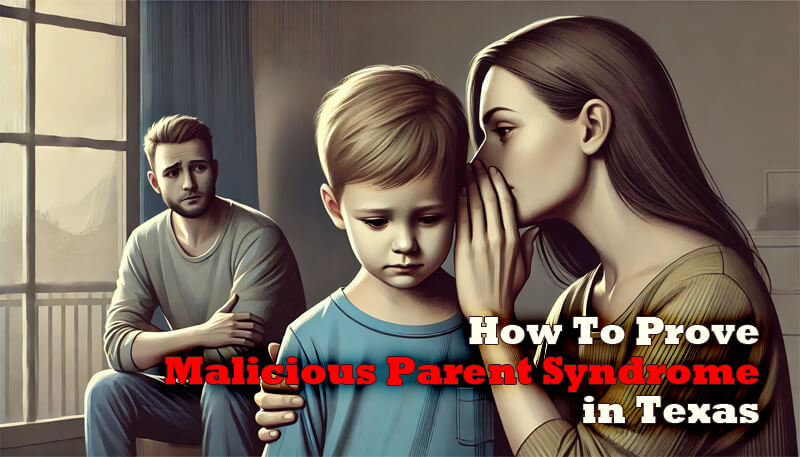Daryl Longworth has spent years helping fathers navigate the toughest situations, including those where your ex is doing everything possible to turn your children against you. If you’ve noticed your relationship with your kids deteriorating due to your ex’s manipulative behavior, you might be dealing with something known as Malicious Parent Syndrome (MPS). But how do you prove it in court? And more importantly, what can you do to protect your relationship with your children? The answers aren’t simple, but they’re within reach. In this guide, I’ll walk you through the steps you need to take, the evidence you need to gather, and the strategies that can help you turn the tide in your favor.
Read on to learn how you can fight back against MPS and ensure your role as a father is preserved, even in the most challenging circumstances.

Understanding Malicious Parent Syndrome (MPS)
Malicious Parent Syndrome is a painful and frustrating experience where one parent deliberately tries to damage the relationship between their children and the other parent. For many dads, this can feel like a never-ending battle. The signs can be subtle at first—maybe your ex refuses to let you see your kids on your scheduled days or starts making baseless accusations about your parenting. These behaviors, unfortunately, are all too common and can escalate quickly.
You might have heard terms like Malicious Mother Syndrome or Manipulative Mother Syndrome. While these terms have historically been used, it’s important to understand that these behaviors aren’t limited to mothers. They can come from any parent, and as a father, it’s crucial to recognize these signs early and take action.
Is Malicious Parent Syndrome a Crime?
One of the first questions many fathers ask is whether MPS is a crime. In Texas, MPS itself isn’t classified as a crime, but the actions associated with it can have serious legal consequences. For example, if your ex is making false allegations or violating court orders, they could face legal repercussions. But generally, MPS is dealt with in civil court, particularly in the context of custody disputes.
Identifying and Proving Malicious Parent Syndrome in Court
Proving MPS can feel like an uphill battle, but it’s not impossible. Here’s what you need to know:
Key Evidence for Proving Malicious Parent Syndrome
Type of Evidence |
Examples |
Importance |
|---|---|---|
Behavioral Patterns |
Documented missed visitations, hostile communication |
Shows consistent alienation attempts |
Psychological Evaluations |
Court-ordered evaluations of both parents and child |
Provides expert analysis of harmful behaviors |
Testimonies |
Statements from family members, teachers, or counselors |
Corroborates your claims with third-party perspectives |
Documentation |
Emails, text messages, social media posts |
Concrete proof of the malicious parent’s actions |
Proving MPS in Texas courts can be challenging, and the burden of proof falls on you. But with the right strategy and legal support, it’s possible. There are even court cases in Texas, like In re A.C.S., where a parent’s manipulative actions led to a favorable custody modification for the other parent.
How Malicious Parent Syndrome Affects Custody
In Texas, the court’s primary concern is always the best interest of the child. When MPS is proven, it can significantly impact custody decisions. If your ex is engaging in this type of behavior, it’s not only harmful to you but also to your children.
 If you can show that your ex’s actions are damaging your relationship with your kids, the court may modify your custody arrangement. This could mean more time with your kids, or even primary custody being shifted in your favor. The process can involve psychological evaluations and, in some cases, court-ordered reunification therapy to help rebuild the bond with your children.
If you can show that your ex’s actions are damaging your relationship with your kids, the court may modify your custody arrangement. This could mean more time with your kids, or even primary custody being shifted in your favor. The process can involve psychological evaluations and, in some cases, court-ordered reunification therapy to help rebuild the bond with your children.
Legal Remedies for Fathers Targeted by Malicious Parent Syndrome
As a father, you have several legal options to protect your rights and your relationship with your children:
Legal Strategies for Malicious Parent Syndrome
- File for Custody Modification: Show that the current arrangement is not in the child’s best interest due to MPS.
- Seek Supervised Visitation: Request that the malicious parent’s time with the children be supervised to prevent further harm.
- Present Evidence in Court: Use documented evidence, witness testimonies, and psychological evaluations to build a strong case.
- Consider Mediation or Therapy: In some cases, these might be recommended to mitigate the impact on the children and attempt to resolve issues outside of court.
Protective Orders Under Texas Law
Type of Protective Order |
Description |
When to Use |
|---|---|---|
Temporary Ex Parte Order |
Immediate, short-term protection without notifying the other parent |
In cases of immediate danger or ongoing harassment |
Final Protective Order |
Long-term protection after a court hearing |
For ongoing malicious behavior that needs sustained intervention |
Reunification therapy can be a game-changer in these cases. This court-mandated therapy focuses on repairing and strengthening your relationship with your kids, ensuring they aren’t caught in the middle of the conflict.
The Role of Attorneys in Malicious Parent Syndrome Cases
Having an experienced attorney by your side can make all the difference. At Longworth Law Firm, we understand the unique challenges fathers face in these situations. We’re here to help you gather evidence, navigate the legal system, and fight for your rights. Our approach is not just about winning your case—it’s about ensuring your children’s well-being and maintaining your role as a loving father.
How Texas Courts Respond to Malicious Parent Syndrome
Texas courts take MPS seriously, especially when it impacts the welfare of the children involved. Judges have the authority to modify custody arrangements, enforce protective orders, and order reunification therapy to help heal the damage caused by MPS. While every case is different, the courts are guided by the principle of protecting the child’s best interests.
Ethical and Psychological Considerations
Handling MPS cases requires a delicate balance. It’s important to approach these situations with a focus on your children’s emotional and psychological well-being. At Longworth Law Firm, we work to ensure that our legal strategies are both effective and ethically sound, keeping your kids’ needs at the forefront.
Court Intervention and Treatment Options
Sometimes, court intervention is necessary to address MPS. This could involve anything from ordering reunification therapy to modifying custody arrangements. These interventions are designed to protect your relationship with your children and help you move forward in a healthier, more positive direction.
FAQs About Malicious Parent Syndrome
What should I do if I suspect my ex is trying to alienate my kids?
Start documenting everything immediately. Keep a detailed record of every interaction with your ex and your children, particularly those that seem hostile or manipulative. Then, consult an attorney experienced in MPS cases to discuss your next steps.
How can I prove that my ex’s behavior is harmful to my kids?
The best way to prove harm is through a combination of documented evidence (like texts and emails), witness testimonies, and psychological evaluations. These can show a pattern of behavior that is damaging to your relationship with your children.
Can I get custody of my kids if I prove Malicious Parent Syndrome?
Yes, if you can prove that your ex’s behavior is harming your children and that a change in custody is in their best interest, the court may modify your custody arrangement. This could mean more time with your kids or even primary custody.
What types of protective orders are available to me in Texas?
There are several types of protective orders available, including temporary ex parte orders for immediate protection and final protective orders for long-term safety. These can prevent your ex from continuing harmful behaviors and help protect your relationship with your children.
What is reunification therapy, and how can it help?
Reunification therapy is a court-ordered process that helps repair and strengthen the relationship between a parent and child that has been damaged by alienation or other harmful behaviors. It focuses on rebuilding trust and improving communication.
Checklist: What to Do if You Suspect MPS
- Start documenting alienating behaviors.
- Consult an attorney with experience in MPS cases.
- Consider requesting a psychological evaluation.
- Look into protective orders if you or your children are being harassed.
- Explore reunification therapy if your relationship with your children has been affected.
Conclusion
If you’re a father dealing with Malicious Parent Syndrome, I want you to know that there is hope. With the right legal support and a strong case, you can protect your relationship with your children and ensure that their best interests are served. At Longworth Law Firm, we’re here to help you every step of the way. Don’t hesitate to reach out for advice or representation. Your kids need you, and together, we can make sure you’re there for them.


